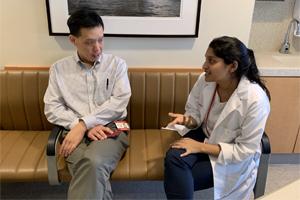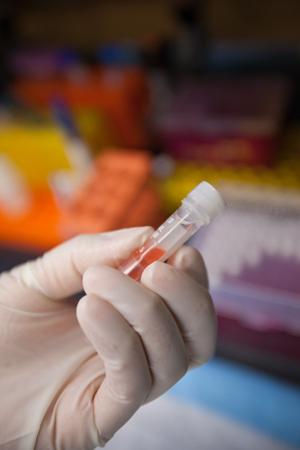
The Medical Research Track (MRT) recruits and trains the next generation of leading physician-scientists. The accelerated 24-month MRT curriculum provides rigorous training in clinical medicine and allows trainees to reach subspecialty training (if desired) by their PGY-3 year to facilitate the establishment of an independent research-based career. Individuals who match into this program are also matched into the fellowship program of interest within the NYP/WCM Department of Medicine. As a "fast track" or research pathway resident, the full training commitment includes two additional years dedicated to research pursuits following subspecialty clinical training. Most MRT candidates have an extensive background in research, typically M.D./Ph.D. or similarly intensive training, and a specific scientific niche.
Weill Cornell Medicine’s renewed and unprecedented commitment to deliver groundbreaking discoveries offers unparalleled opportunities to current and future leaders in biomedical research. New scientific initiatives, housed in the 480,000 square foot Belfer Research Building, include interdisciplinary programs in the areas of cancer, cardiovascular disease, global health, metabolic health, inflammatory bowel disease, and more. An innovative set of partnerships between Weill Cornell Medicine, Memorial Sloan Kettering Cancer Center, Rockefeller University, and Takeda Pharmaceutical Company, termed the Tri-Institutional Therapeutics Discovery Institute, Inc. (Tri-I TDI) and Bridge Medicines, aim to expedite early-stage drug discovery into therapies for patients. Importantly, these initiatives have also been accompanied by parallel investments in trainee mentorship across all stages of their professional career paths, including a specific emphasis on physician-scientists.
Candidates with substantive training in, and a clearly defined commitment to, research are encouraged to apply. Please note: the Supplemental Application is required for consideration of this program.

As prescribed by the research pathway of the American Board of Internal Medicine (ABIM), this track provides extensive, coordinated training in clinical sciences and basic biomedical research. The first two years are identical to the categorical residency program with the addition of career development workshops and personalized academic mentorship. In addition, candidates within the Medical Research Track are afforded elective time to explore the scientific offerings of the Tri-Institutional Community and future potential laboratory opportunities. By the PGY3 year of training, Medical Research residents are fully immersed in their clinical subspecialty field of choice, after which they commit to spend 80 percent of their time in full-time research training, and 20 percent of their time in clinical work.
Matched applicants are assured a fellowship position in their chosen subspecialty, or may choose to pursue fellowship elsewhere.
| Training | Duration |
|---|---|
| Internal Medicine (direct patient responsibility - 20 months) | 24 months |
| Research (80%) | 36 months |
| Ambulatory Clinics During Research (10%) | 1/2 day per week |
| Additional Clinical Training During Research (10%) | May be intermittent or block time |
| Total | Five Years |
| Internal Medicine Examination | Summer, R-5 |
| Training | Duration |
|---|---|
| Internal Medicine (direct patient responsibility - 20 months) | 24 months |
| Subspecialty Clinical | 12-24 months* |
| Research (80%) | 36 months |
| Ambulatory Clinic During Research | 1/2 day per week |
| Total | 6-7 years* |
| Internal Medicine Examination | Summer, R-4 |
| Subspecialty | Fall, R-6 or 7* |
* based on the subspecialty
Taken from ABIM Policies and Procedures February 2011
Program Director, Medical Research Track
Professor of Medicine, Weill Cornell Medical College
Attending Physician, NewYork-Presbyterian Hospital/Weill Cornell Medical Center
Advisory Committee for the Medical Research Track

Oncology, MSKCC
Endocrinology, Diabetes & Metabolism
Jill Roberts Center for Inflammatory Bowel Disease; Gastroenterology & Hepatology
Rheumatology, HSS
Clinical Epidemiology & Evaluative Sciences
Center for Clinical and Translational Science, Rockefeller
Clinical and Translational Science Center; Endocrinology, Diabetes & Metabolism
Oncology, MSKCC
Medical Oncology, MSKCC
Gastroenterology & Hepatology; Roberts Institute
Oncology, MSKCC
Microbiology & Immunology
Gale and Ira Drukier Institute for Children’s Health (Rheumatology)
Cardiovascular Research Institute
Sandra and Edward Meyer Cancer Center; Hematology & Medical Oncology